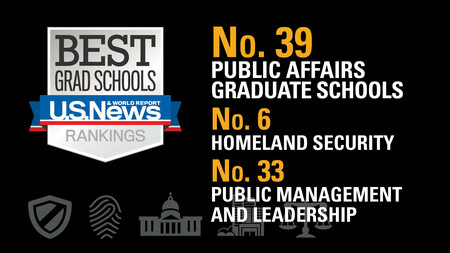Online Master’s in Homeland Security and Emergency Preparedness | VCU Online
Prepare your community for the unpredictable and unexpected.
Get more information about the program including coursework, tuition and financial aid.
The Nation’s First Master’s in Homeland Security Degree and Emergency Preparedness
From the California wildfires to the coronavirus pandemic, global emergencies continually remind us that a swift, coordinated response can save lives. Born of this understanding, the online Master of Arts in Homeland Security and Emergency Preparedness (HSEP) prepares students to lead crucial security and emergency response teams. Our in-depth curriculum goes beyond traditional security education to equip students with practical decision-making, leadership, and policy-making skills.


Nationally recognized
No. 6
Homeland Security and Emergency Management Programs, Best Public Affairs Schools Nationally
No. 39
Best Public Affairs Graduate Schools Nationally
No. 2
Best Public Affairs Program in Virginia
No. 33
Schools of Public Affairs and Public Management and Leadership Programs Nationally
Source: U.S. News & World Report, 2023, 2024
Why earn your homeland security master’s degree online from the L. Douglas Wilder School of Government and Public Affairs at VCU?
A leading emergency preparedness program unlike any other.
Gain hands-on experience in a program that blends multiple disciplines and cultivates practical skills.
Built for working professionals.
Complete a flexible online program that features learning modules to create engaging learning experiences.
Exceptional faculty dedicated to full time teaching and research.
Learn from nationally recognized experts in military, law enforcement, fire and EMT, counterterrorism, emergency management, and intelligence.
Build a professional network.
Join a cohort of current emergency management professionals and gain invaluable connections in the field.
Is this homeland security degree right for you?
The homeland security degree program prepares you to lead first responders and protect against domestic and global threats. With backgrounds ranging from criminal justice and cybersecurity to immigration and disaster relief, students learn from each other’s unique perspectives. Graduates move on to become planners, resource managers, and partners in educating the communities they serve.
Shield your community from the unpredictable and unknown.
Become a well-rounded expert to protect against natural disasters, cyberattacks, and terrorist threats through policy and action.
Take your career — and your service — to the next level.
Hone your skill set while deepening your understanding of the larger organizational, social, political, ethical and economic aspects of disaster studies.
Excel in your academic or professional life.
Enroll in a program designed to help students secure career paths in intelligence, cybersecurity, homeland security, emergency management and more.
What to expect
12 courses, totaling 36 credits
1.5 to 2 years total with 6 to 8 hours per week/course
60 to 90-minute weekly live sessions
Flexible online format
Case studies and simulations for real-world experience
A legacy of public policy and social equity
What you’ll learn
Intersection of policy and action.
Prepare for career growth with the tools you need to impact your community on micro and macro levels.
Hands-on experience.
Gain experience in crafting successful public policies through simulations, case studies and class discussion.
Holistic understanding.
Broaden your skills with an interdisciplinary curriculum designed to address modern threats to our infrastructure, public safety, cybersecurity, and public health.
Partnership and service.
Learn the principles of public policy leadership and ethics to collaborate with key officials and agencies.
“The faculty are amazing. All of my professors have gone above and beyond in supporting and encouraging me. And those relationships don’t end when a class ends.”
– Kabrina Tippett, student
Explore Student and Faculty Profiles“We have faculty with backgrounds in criminal justice, public administration, emergency management and political science, to name a few. And so what you get in this program is access to people who bring a different lens towards understanding homeland security topics.”
– David Webber, assistant professor and assistant chair of homeland security and emergency preparedness
Curriculum
Here is how program faculty describe the courses:
Homeland security and emergency preparedness are two sides of the same coin. Intel, terrorism and cyber represent homeland security. Disaster response, emergency management, and public health are consider emergency preparedness. This course provides an introduction to all these issues and frames other courses in the program through challenging scenarios, group work, and individual efforts.
Profiling terrorists, countering far right extremism, preventing terrorist radicalization. Far right extremism is on the rise and now is the time to implement counter-radicalization strategies. The Terrorism course provides foundational knowledge to identify and deter terrorist activity.
Disasters happen. Some are natural, some are man-made, the responses are largely the same. Understanding disaster response, recovery, and mitigation will help you make the next disaster less severe.
An examination of strategic planning’s guiding principles and how responders can leverage it to identify resource requirements and a prioritized acquisition process. The course analyzes the strategic planning goal of designing a unified effort inclusive of the multiple agencies (governmental and nonprofit), distinct communities and private industries affected by natural disasters or terrorist incidents.
Faculty: Brie Haupt
There are expected risks, like a hurricane that we know is coming. There are unexpected risks, like a terrorist attack or a forest fire. Assessing and addressing vulnerabilties is smart risk management. We have finite resources so they must be used efficiently. Understand risk and make the right decisions.
Semester course; 3 lecture hours. 3 credits. An examination of local, state and federal law enforcement agencies’ evolving policies on crisis and consequence management, as well as court decisions guiding these policies and interpreting their implementation. Students will engage in case-study analysis while learning the fundamentals of policy development. Course content will include analysis and discussion of relevant statutes and court cases, and the issues, processes and procedures associated with the development and implementation of judicial policies that attempt to balance civil rights and homeland security, as well as legal aspects of natural disasters and public health crises.
The private sector has a critical role in homeland security and emergency management. Power companies, healthcare, infrastructure, and many other private sector elements have tremendous responsibilities in homeland security and emergency preparedness. Don’t neglect the private sector—where would we be without power, without internet, without healthcare?
Information drives decision making. Data quality is defined by the quality of the questions you ask. Learn how to interpret and conduct research that changes what we know and defines policy and practice.
The next war will be fought on the cyberfront. Connecting cyber issues, security, and policy is critical for both the public and private sector. Cyber attacks, cyberwarfare, and cyber policy will drive the future of homeland security. Choose to be involved.
Intelligence comes in many forms—all are suspect. Understanding how to assess intel quality, finding actionable intel, then changing resources based on that information—those are the processes of intel. Know your enemy. Defeat your enemy.
The COVID-19 pandemic demonstrated the importance of public health preparedness. Disease outbreaks, nuclear disasters, medical infrastructure, and many other threats require public health readiness. Approximately one million people died during the pandemic—we must be ready for the next public health threat.
The capstone course represents the culmination of your homeland security emergency preparedness education. You will create a project that can advance your career, further knowledge, and impact policy. Show us what you have learned.
You can find more information about our courses in the Bulletin.
Meet some of our faculty

Maureen Moslow-Benway
While serving as a Special Agent with the Air Force Office of Special Investigations, Maureen Moslow-Benway was selected twice as the Officer Agent of the Year for Southeast Asia and the Southeastern U.S. She was also honored as the Counterintelligence Agent of the Year for the Department of Defense.

William Pelfrey Jr.
William Pelfrey’s work addresses issues of programmatic effectiveness within the context of public safety, particularly revolving around law enforcement agencies.

David Webber
David Webber utilizes a mixture of social psychological experimental methods, field surveys in at-risk locations and qualitative analyses to examine the factors involved in the radicalization and deradicalization processes of violent extremists.
Take the next step in your leadership journey
Built for working professionals, Virginia Commonwealth University’s online master’s degree in Homeland Security and Emergency Preparedness equips students with the skills to support their communities when the unexpected happens. Taught by nationally recognized experts with diverse field experience, our renowned curriculum blends multidisciplinary coursework with hands-on training, preparing students to lead crucial security and emergency response teams. Ready to cultivate practical leadership skills and take your career in service to the next level?
About the Wilder School
Admissions Process
Career Outcomes
Request Information
Key dates and deadlines
| Term | Early Decision Application Deadline | Priority Application Deadline | Final Submit Application Deadline |
|---|---|---|---|
| Fall 2025 | May 26, 2025 | June 30, 2025 | July 21, 2025 |
Request information
Please complete the form below to receive information about the online Master of Arts in Homeland Security and Emergency Preparedness.